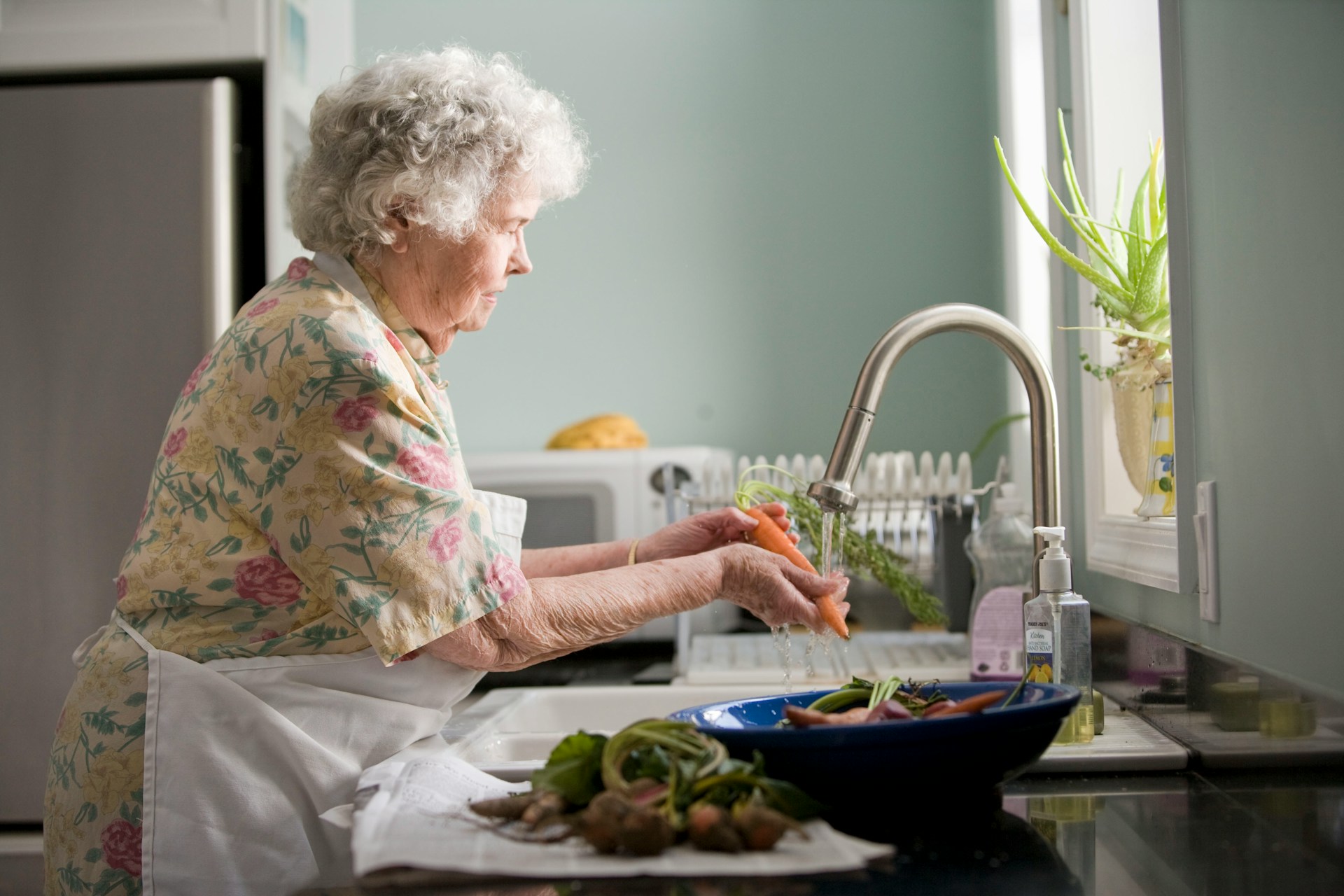Enjoying a healthy meal with friends and family is great for physical and mental health. Moments like these are ones you’ll cherish for years to come. Whether you’re cooking together or digging into a meal together, eating with family and friends is an enjoyable experience for all ages.
As our loved ones age, their nutritional needs and desires change, and you may be wondering if they’re getting the nutrition that they need to sustain their lifestyle. Approximately one in three seniors have difficulty meeting their nutritional needs, often due to loss of appetite. While it may be due to a choice, a side effect of medications, declining health, or lifestyle change, they need our support to help avoid related injury, illness, and malnutrition.
Keep reading to learn more about managing appetite loss in seniors living at home.
Healthy eating matters
Good nutrition is essential for healthy aging. The better nourished you are, the longer you’ll be physically and mentally able to stay in your home, retain your independence, and manage a positive quality of life.
As we age, our nutritional needs (and desires) change. Older adults are often less physically active, which slows their metabolism and lowers their caloric needs. However, studies show that our absorption of nutrients becomes less efficient, so our nutrient requirements often increase. Seniors may need help understanding and compensating for how their nutritional needs change with age.
Quality nutrition for seniors is essential to:
- Provide your body with essential nutrients and energy
- Lower risk of heart disease and type 2 diabetes
- Strengthen your muscles and bones to reduce the chances of injury when you fall.
- Provide social interaction when eating with others.
Loss of appetite causes in seniors
It may not always be noticeable when your loved one loses their appetite, but there are signs to look for. They may:
- Decline meals with others
- Show signs of sustained sadness or depression
- Push their food around their plate, not eating it
- Have low energy
- Experience increased frequency of illness
- Experience unexpected weight loss
- Be more prone to injuries from falls
- Experience muscle weakness
- Have unusually bruised, dry, or cracked skin
- Struggle with chewing or swallowing
- Feel regularly constipated or struggle to use the toilet
- Have an abundance of expired food in the fridge.
As a caregiver, your role in identifying and addressing appetite loss in seniors is crucial. These symptoms may be the result of poor nutrition or indicate other health concerns. It’s important to talk to your loved one’s healthcare provider if you have any reason to suspect they are not getting the nutrition they need.
Aside from the natural aging process, the reasons of loss of appetite in seniors may vary. Most often, they include:
- Struggling to eat (due to mobility issues, pain, or other physical impairment)
- Loss of smell (due to natural aging) may make food less desirable
- Side effects of medications
- Side effects of illness or disease
- Financial struggles (being unable to afford healthy foods)
- Moving into a new home
- Missing cooking or large families (and are now cooking for just one or two people)
Tips to support nutrition in seniors living at home
If your loved one lives at home, you can support their healthy eating routines. Here are a few ways to ensure their nutritional need are being met:
Increase fluids and fibre: Drinking more water is essential to keeping your body hydrated to avoid fatigue and muscle stiffness. A diet with fruits, vegetables, and whole grains increases fibre intake and can help prevent constipation.
Soften food (to make it easier to swallow): If a senior’s malnutrition is due to trouble chewing or swallowing, consider preparing softer foods or foods with sauces. Ensuring they have water or healthy fluids with their meals can help with swallowing and digestion.
Choose smaller portions, more nutrients: If getting them to eat three big meals daily is a struggle, consider breaking them into smaller, snack-sized meals and eating more frequently. Fill these meals with healthy protein (to keep them fuller longer) and high nutrients.
Consider supplements if needed to support their nutritional needs further. Ask their doctor about recommended vitamins and minerals for their age, including Vitamins B6 and B12, Vitamin D, Calcium, and Iron.
Create an “emergency” food supply: Stock their shelves and freezer with easy, healthy meals and snacks. These may include frozen vegetables and fruit, whole grain bread, skim milk powder, peanut or nut butter, pasta, canned sauces and fish, and beans.
Be mindful of depression: Watch your loved one for signs of depression. If they’re in poor mental health, it can reduce their desire to eat. Read these tips to be aware of and enhance seniors’ mental health.
Eat together: Having someone to eat with may give them a “reason” to eat. Eating together is an occasion they can look forward to, whether you cook a healthy meal at home together or splurge and eat out for a special occasion. It doesn’t have to be you who joins them every time (especially if you have your own family to support). Encourage them to invite other relatives and friends over for meals, too.
Manage medications and pain: If you notice malnutrition in your senior loved one, discuss it with their home care aid or doctor. It may be a side effect of their health or their medications. Explain the symptoms you’ve observed and ask their doctor to review their medications to ensure they’re taken as prescribed and their dosage is still accurate. Be sure to ask about medication counter-indications to ensure that the seniors’ eating and lifestyle habits don’t contribute to their loss of appetite.
See a dentist: Poor dental health can also contribute to seniors’ appetite loss. Eating can be painful when their teeth are unhealthy or dentures are not fitted correctly. Ensure they get regular dental visits to ensure their oral health is as healthy as possible.
Get exercise: Exercise can help increase their appetite and improve fluid intake. Exercise will also give them a boost of energy. It can also create a stronger urge to eat and make them thirsty.
Hiring hero home care support: Having someone around the house who is mindful of your loved one’s nutrition and health can help catch signs of malnutrition and loss of appetite in seniors early.
How a Hero Home Care aide can help your loved one
Here are five ways a home care aide can support your senior loved ones’ nutritional and healthcare needs:
- Cooking and meal support: We can help your loved one eat a balanced and nutritious diet. This support may include helping them plan, shop, and cook meals.
- Companionship: Our aides are friendly faces who can spend quality time with your loved one, whether that’s eating meals, having a stimulating conversation, or playing cards.
- Homemaking services: We can help their home stay in top shape so they always have a clean, sanitary place to prepare and enjoy food.
- Nursing care: Our nurses can help with medication management, answer questions about medication side effects, support wound or catheter care, and provide nursing assessments. They can also liaise with your doctor for appointments and more advanced care.
- Personal care services: When your loved one has their personal care needs supported (bathing, dressing, grooming, oral hygiene…etc.), they’re more confident. This confidence can help reduce or prevent depression and encourage them to eat a healthy diet.
Hero Home Care senior’s support options are flexible based on what you need (occasional, part-time, full-time, or around-the-clock care and support).
To learn more about how our heroes can support the health and nutritional needs of your senior loved ones, schedule a free in-home care consult today.

